九年级九年级人教版英语单元知识点总结归纳
Unit4+重点短语归纳2024-2025学年人教版英语九年级全册

Unit4 重点短语归纳Section A Part 11.过去常做___________2.被用来做_______________3.习惯做…______________4.有幽默感的__________(adj.)幽默______(n.) 5.沉默的(adj.)_______沉默(n.)______默默地(adv.)_________ 6.对…有帮助______________7.足够勇敢__________ 8.是…队的一员________________9.不时,有时_____________ 10.同时________________11.始终,一直_____________ 12.有时_________13.及时_________ 14.按时__________ 15.变红_________16.看见某人在做…_____________看见某人做…_____________ 17.如此好的一个主意______________18.自从…以来已经…(时间)了。
___________________________19.自从我们上次看见小学同学以来已经三年了。
____________________________________________________________________ ____________20.采访19岁的亚洲的流行歌星________________________21.19岁___________22.开始学习(做)某事_____________23.应付,处理__________ 与_____(how/what)搭配do with与_____(how/what)搭配 deal ______(过)______(过分)Part 21.敢于做… __________31.取得好分数____________2.不再(次数)________________=________(时间)_______________=________ 2.一吨…_____________3.许多______=______4.得到许多关注_________________=_________________ 5.对…小心____________6.害羞的_____(adj.) 害羞_______(n.)7.继续战斗_________8….的数量____________ (单/复数) 9.许多___________(单/复数)10.少量的_______________ 大量的________________11.担心…_________=___________ 12.成功做到_________13.约定在…时间/地点_______________14. 需要某物__________15.需要做…____________ 16.需要某人做…________________17.害怕…____________ 18.放弃________ 19.警卫________20.在…前(外)____________ 在…前(内)_____________21.私人时间___________ 22.闲逛_________ 23.公开地_______24.看关于欧洲的历史的书______________________25.非洲的文化_____________ 26.人群,观众_______(可数n.)27.拥挤的_________(adj.) 28.在观众前_______________29.做演讲____________ 30.公众,众人__________Section B part 11.画画______________=_______________2.一只蚂蚁_________3. 其他昆虫 ____________4.是足球队的一员_____________5.穿(后+衣物,指状态)______穿(后+衣物,指动作)______ 给...穿衣服(后+人) _______穿...颜色的衣服 _________ 6.一直,总是____________7.对...感到紧张 ____________ 8.担心..._________=__________9.步行去学校____________ =_______________10.一位来自农村的15岁的普通男孩_________________________________11.在...方面做得好____________ = _____________12.很难相信... _______________13.很少_______(肯定词/否定词)14.制造麻烦 _____________ 15.搬去... _________16.在一起度过许多时间___________________17.照顾__________=___________18.当心,小心_________=__________=__________19.想念______, 错过_____ 20.孤独的,荒凉的________21.独自的,独自地_______ 22.高兴的 ______ (反义词)_______ 23.高兴,幸福(n.)__________(反义词)__________part 21.影响__________(n./v.)2.对...有影响_________________3.缺席...___________4.对...没有兴趣_________________=______________________5.对...有兴趣__________________=______________________6.考试不及格______________7.未能做...____________8.决定做..._______________ =________________9.一个寄宿学校____________ 10.建议做...___________11.建议某人做..._____________ 12.亲自_________13.发现在那里生活困难__________________14.为...骄傲/自豪 ___________ =_____________15.精确的(adj.)______精确地(adv.)_______ 16.即使_________17.总的,普遍的,常规的(adj.)________ 一般地,通常地________18.总体的介绍_____________ 19.乘24小时的火车____________20.到达...________=________ 21.到达(大地方)_________到达(小地方)________ 22.参加(组织/人)_____参加(活动)__________=_________ 23.总是做..._____________24.与某人交流_______________ =__________________25.在最近几年____________________ (时态:_________)参考答案Section A Part 1ed to do…2.be used to do…3.be used to doing...4. humorous humor5.silent silence silently6. be helpful to sb./ sth.7.brave enough 8.on a … team9.from time to time 10.at the same time11.all the time 12. at times13.in time 14.on time15.turn red 16.see sb. doing… see sb. do…17.such a great idea18. It has been+一段时间+ since...19. It has been three years since we last saw our primary school classmates.20. Interview 19- year- old Asian pop star21.19 years old 22.take up ( doing) sth.23.deal with how what dealt dealtPart 21.dare to do…2.not…anymore= no more not…any longer= no longer3.a ton of…4.tons of = lots of5.get tons of attention=get lots of attention6.be careful about…7.shy shyness8.fight on9.the number of…10.a number of...11.a small number of… a large number of…12.worry about = be worried about 13.make it14.make it+时间/地点15.require sth.16.require doing…17. require sb. to do…18.be afraid of…19.give up 20. guard21.in front of…in the front of…22.private time 23. hang out 24.in public25.read books on European history 26. African culture27.crowd 28.crowded 29. in front of crowds30.give a speech 31.the public 32.get good scoresSection A Part 11.paint a picture = draw a picture2. an ant3.other insects4.on the soccer team5.wear put on dress be in+颜色6.all the time7.be nervous about 8.worry about = be worried about9.walk to school = go to school on foot10.a normal 15- year- old boy from the countryside11.do well in…=be good at…12.It's hard to believe that.. 13.seldom14.cause some problems 15.move to…16.spend a lot of time together17.look after = take care of 18. take care= look out= be careful 19. miss miss 20. lonely21.alone 22. happy unhappy 23. happiness unhappinessPart 21.influence2.have an influence on sb/ sth3. be absent from4.be/ become less interested in…=take/ show less interest in…5.be/ become interested in…=take/ show interest in…6.fail the examination7.fail to do…8.decide to do …= make a decision to do…9.a boarding school 10. advise doing sth.11.advise sb. to do sth. 12. in person13.find life there difficult 14. be proud of…take pride in…15.exact exactly 16. even though 17. general generally 18. general introduction 19. take 24- hour train20.get to…reach…21.arrive in…arrive at…22.join take part in…= join in…23.be always doing...municate with…= have communication with…25.in the past/ last few years完成时。
新人教版九年级英语全册知识点归纳

新人教版九年级英语全册知识点归纳(最新)Unit 1 How can we become good learners?1. by doing sth 通过做某事2.it +be+adj+to do sth 是……的3.finish doing sth 完成某事4.what about doing sth?做某事样?5.try to do sth 尽力做某事6.the +比较级,the+比较级越……,就越……7.find it+adj+to do sth 发现做某事8.be afraid of doing sth 害怕做某事9.help sb (to) do sth 帮助某人做某事10.practice doing sth 练习做某事11.keep doing sth 一直做某事12.be afraid to do sth 害怕做某事13.begin to do sth 开始做某事14.want to do sth 想要做某事15.need to do sth 需要做某事16.remember to do sth 记得做某事17.shoot 射(射着,射死等表结果)18.shoot at(瞄准)射Unit 2 I think that moon cakes are delicious!1.感叹句式一:What+(a/an) +adj+名词(+主语+谓语+其他)!多么……的……感叹句式二:How +adj/adv+主语+谓语+其他!……多么……!2.in+时间段在……后3.give sb. sth. 给某人某物4.plan to do sth 计划做某事5.refuse to do sth 拒绝做某事6.one of +名词复数形式……之一7.it +is+名词+动词不定式(to do sth)做某事是…8.what …think of…?认为…怎么样?9.make sb do sth 让某人做某事ed to be 过去是……11.warn sb(not) to do sth告诫某人做某事12.tell sb(not)to do sth 告诉某人做某事13.decide to do sth 决定做某事14.promise to do sth 承诺、答应做某事unit3 Could you please tell me where therestaurants are?1.not ……· until……直到……猜……You never know until you try something.2.let’s do sth 咱们做某事吧!3.spend time doing sth 话费时间做某4.thank sb for doing sth 为做某事而感谢某5.would like to do sth 想要做某事6.look forward to doing sth 盼望做某事7. It seems (that)… It seems a rock bandplays there every evening.8. Could you please tell me... ?Could youplease tell me how to get to the post office?9.take的用法① take some foodtake some medicine (=have吃,喝)② take notes做笔记③take one’s temperature ( 测量)④It takes sb some time/money to dosomething (花费,需要)⑤I’ll take this coat.(=buy购买)⑥ take somebody / something to(带领,拿去,取)⑦take a train to Chongqing (乘坐)⑧ take off(脱下)10.turn 的用法turn to page 80 翻到It is your turn.轮到你了。
人教版九年级英语知识点总结
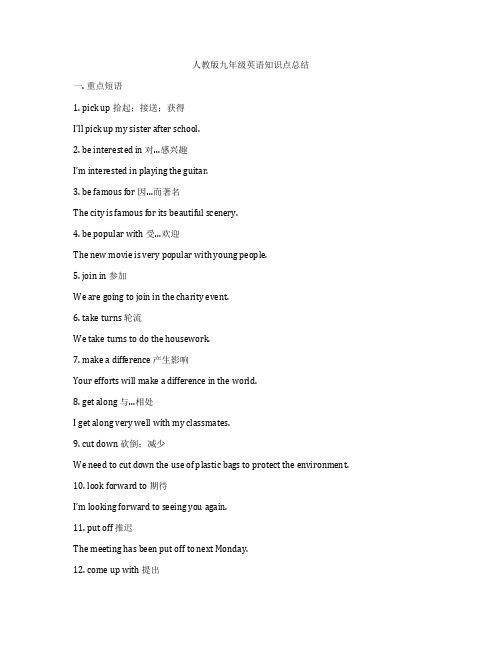
人教版九年级英语知识点总结一. 重点短语1. pick up 拾起;接送;获得I’ll pick up my sister after school.2. be interested in 对…感兴趣I’m interested in playing the guitar.3. be famous for 因…而著名The city is famous for its beautiful scenery.4. be popular with 受…欢迎The new movie is very popular with young people.5. join in 参加We are going to join in the charity event.6. take turns 轮流We take turns to do the housework.7. make a difference 产生影响Your efforts will make a difference in the world.8. get along 与…相处I get along very well with my classmates.9. cut down 砍倒;减少We need to cut down the use of plastic bags to protect the environment.10. look forward to 期待I’m looking forward to seeing you again.11. put off 推迟The meeting has been put off to next Monday.12. come up with 提出We need to come up with a plan for the project. 13. keep in touch 保持联系We keep in touch by sending emails.14. make up 编造;弥补She made up a story about why she was late.15. run out of 用完We have run out of milk and need to buy some more.二. 重点语法1. 一般现在时肯定句:主语 + V原 + 其他He plays football every weekend.否定句:主语 + do not/does not + V原 + 其他I do not like watching horror movies.疑问句:Do/Does + 主语 + V原 + 其他Do they enjoy playing basketball?2. 一般过去时肯定句:主语 + V-ed/Vt + 其他She visited Beijing last year.否定句:主语 + did not + V原 + 其他We did not go to the concert last night.疑问句:Did + 主语 + V原 + 其他Did you finish your homework yesterday?3. 现在进行时肯定句:主语 + am/is/are + V-ing + 其他She is watching TV now.否定句:主语 + am/is/are + not + V-ing + 其他He is not playing football at the moment.疑问句:Am/Is/Are + 主语 + V-ing + 其他Are you studying for the exam?4. 一般将来时肯定句:主语 + will + V原 + 其他She will travel to Japan next month.否定句:主语 + will not + V原 + 其他I will not forget to call you.疑问句:Will + 主语 + V原 + 其他Will he come to the party?5. 现在完成时肯定句:主语 + have/has + V过去分词 + 其他They have finished their homework.否定句:主语 + have/has + not + V过去分词 + 其他We have not seen this movie yet.疑问句:Have/Has + 主语 + V过去分词 + 其他Have you ever been to Paris?6. 被动语态肯定句:主语 + am/is/are + V过去分词 + 其他The book is written by my favorite author.否定句:主语 + am/is/are + not + V过去分词 + 其他The dishes are not washed by my brother.疑问句:Am/Is/Are + 主语 + V过去分词 + 其他Is the car fixed by the mechanic?三. 重点词汇1. 人物teacher 老师student 学生doctor 医生nurse 护士engineer 工程师pilot 飞行员musician 音乐家actor 演员writer 作家scientist 科学家athlete 运动员2. 动作run 跑步jump 跳跃swim 游泳dance 跳舞sing 唱歌play 演奏climb 爬山cook 烹饪paint 绘画ride 骑行3. 环境house 房子school 学校hospital 医院office 办公室library 图书馆park 公园beach 海滩mountain 山river 河lake 湖四. 重点句型1. 八大情态动词can 能够I can speak English fluently.could 过去能够She could play the piano when she was five. may 可能May I go to the restroom, please?might 可能It might rain this afternoon.must 必须You must finish your homework before 8pm. shall 将要Shall we go to the movies tonight?should 应该You should study for the exam tomorrow.will 将要We will visit the Great Wall next week.2. 祈使句Be quiet! 安静!Don’t be late! 别迟到!Sit down, please. 请坐下。
人教版九年级全一册英语Unit1单元语法知识点总结
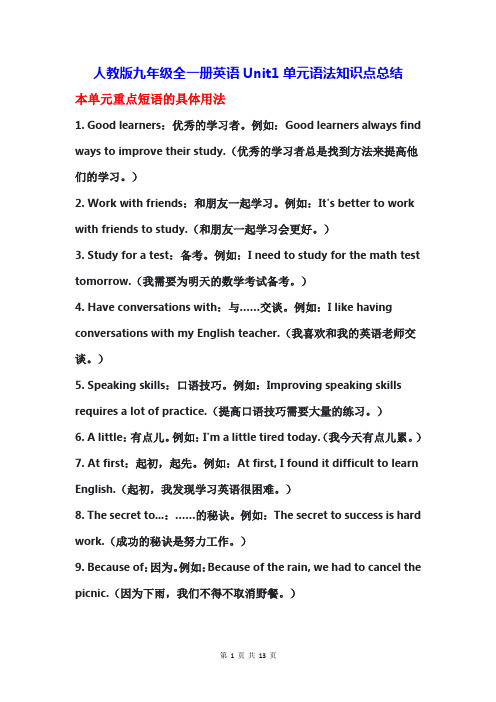
人教版九年级全一册英语Unit1单元语法知识点总结本单元重点短语的具体用法1. Good learners:优秀的学习者。
例如:Good learners always find ways to improve their study.(优秀的学习者总是找到方法来提高他们的学习。
)2. Work with friends:和朋友一起学习。
例如:It's better to work with friends to study.(和朋友一起学习会更好。
)3. Study for a test:备考。
例如:I need to study for the math test tomorrow.(我需要为明天的数学考试备考。
)4. Have conversations with:与……交谈。
例如:I like having conversations with my English teacher.(我喜欢和我的英语老师交谈。
)5. Speaking skills:口语技巧。
例如:Improving speaking skills requires a lot of practice.(提高口语技巧需要大量的练习。
)6. A little:有点儿。
例如:I'm a little tired today.(我今天有点儿累。
)7. At first:起初,起先。
例如:At first, I found it difficult to learn English.(起初,我发现学习英语很困难。
)8. The secret to...:……的秘诀。
例如:The secret to success is hard work.(成功的秘诀是努力工作。
)9. Because of:因为。
例如:Because of the rain, we had to cancel the picnic.(因为下雨,我们不得不取消野餐。
最全面人教版九年级上册英语各单元知识点总复习归纳总结

最全面人教版九年级上册英语各单元知识点总复习归纳总结Unit 1: Hello!- Greetings and introductions: Learn how to greet people and introduce yourself.- Numbers: Practice numbers and learn how to say and write them.- Personal information: Learn how to ask and answer questions about personal information like name, age, and nationality.Unit 2: How Do You Study for a Test?- Study methods: Learn different ways to study for tests and improve learning efficiency.- Time management: Understand the importance of time management in studying.- Test preparation: Learn strategies for preparing effectively for exams.- Giving advice: Practice giving and receiving study advice using modal verbs.Unit 3: What Are You Doing for Vacation?- Vacation plans: Learn how to talk about your plans for the vacation.- Leisure activities: Discuss different leisure activities and preferences.- Present continuous tense: Understand and use the present continuous tense to talk about present actions.- Future plans: Express future plans and intentions using "be going to" and present continuous tense.Unit 4: I Used to Be Afraid of the Dark.- Past experiences: Learn how to talk about past experiences using "used to" and simple past tense.- Phobias and fears: Discuss different phobias and fears people may have.- Narrative tenses: Understand and use narrative tenses to talk about past events.Unit 5: What is the highest mountain in the world?- Geography and landmarks: Learn about different geographical features and famous landmarks.- Describing places: Practice describing different places using adjectives.- Research skills: Learn how to conduct research and gather information about different topics.Unit 6: Why don't you get her a scarf?- Giving suggestions: Practice suggesting and responding to suggestions.- Gift ideas: Discuss different gift ideas for various occasions.- Buying clothes: Learn how to describe and buy clothes in a store.- Preferences: Express personal preferences and opinions using adjectives.Unit 7: Teenagers should be allowed to choose their own clothes.- Rules and regulations: Discuss rules and regulations for teenagers.- Arguments for and against: Present arguments for and against a given topic.- Writing an opinion article: Learn how to write an opinion article expressing personal views.- Persuasive language: Use persuasive language to convince others of a certain viewpoint.Unit 8: I'll help clean up the city parks.- Volunteering: Discuss different volunteer activities and their benefits.- Environmental issues: Learn about environmental problems and ways to address them.- Expressing willingness: Use "will" and "be willing to" to express willingness to help.- Making suggestions: Practice making suggestions on how to improve the environment.Unit 9: What does he look like?- Physical appearance: Learn vocabulary to describe people's physical appearance.- Personality traits: Discuss different personality traits and their impact on people's lives.- Describing people: Practice describing people using adjectives and sentence structures.- Role plays: Act out different scenarios and describe the characters involved.以上是最全面人教版九年级上册英语各单元知识点的总复习归纳总结。
人教版九年级英语全册各单元知识点总结
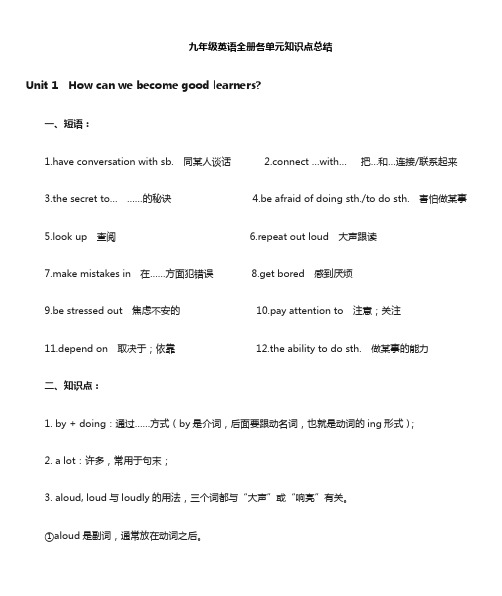
九年级英语全册各单元知识点总结Unit 1 How can we become good learners?一、短语:1.have conversation with sb. 同某人谈话2.connect …with… 把…和…连接/联系起来3.the secret to… ……的秘诀4.be afraid of doing sth./to do sth. 害怕做某事5.look up 查阅6.repeat out loud 大声跟读7.make mistakes in 在……方面犯错误8.get bored 感到厌烦9.be stressed out 焦虑不安的10.pay attention to 注意;关注11.depend on 取决于;依靠12.the ability to do sth. 做某事的能力二、知识点:1. by + doing:通过……方式(by是介词,后面要跟动名词,也就是动词的ing形式);2. a lot:许多,常用于句末;3. aloud, loud与loudly的用法,三个词都与“大声”或“响亮”有关。
①aloud是副词,通常放在动词之后。
②loud可作形容词或副词。
用作副词时,常与speak, talk, laugh等动词连用,多用于比较级,须放在动词之后。
③loudly是副词,与loud同义,有时两者可替换使用,可位于动词之前或之后。
4. not …at all:一点也不,根本不,not经常可以和助动词结合在一起,at all 则放在句尾;5. be / get excited about sth.:对…感到兴奋;6. end up doing sth:终止/结束做某事;end up with sth.:以…结束;7. first of all:首先(这个短语可用在作文中,使得文章有层次);8. make mistakes:犯错make a mistake 犯一个错误;9. laugh at sb.:笑话;取笑(某人)(常见短语)10. take notes:做笔记/记录;11. native speaker 说本国语的人;12. make up:组成、构成;13. deal with:处理、应付;14. perhaps = maybe:也许;15. go by:(时间)过去;16.each other:彼此;17.regard… as … :把…看作为…;18.change… into…:将…变为…;19. with the help of sb. = with one's help 在某人的帮助下(注意介词of和with,容易出题)20. compare … to …:把…比作… compare with 拿…和…作比较;21. instead:代替,用在句末,副词;instead of sth / doing sth:代替,而不是(这个地方考的较多的就是instead of doing sth,也就是说如果of后面跟动词时,要用动名词形式,也就是动词的ing形式)22.Shall we/ I + do sth.? 我们/我…好吗?23. too…to:太…而不能,常用的句型是too+形容词/副词+ to do sth.Unit 2 I think that moon cakes are delicious!一、短语:1. the Lantern Festival 元宵节2. the Dragon Boat Festival 端午节3. the Water Festival 泼水节4. remind sb. of 使某人想起5. eat five meals a day 一天吃五餐6. put on five pounds 体重增加了五磅7. treat sb. with. 用/以……对待某人8. be similar to... 与.......相似9. end up 最终成为/处于10. share sth. with sb. 与……分享……11. as a result结果12. one... the other... (两者中的) 一个…另一个…13. take sb. out for dinner 带某人出去吃饭14. dress up 乔装打扮15. haunted house 鬼屋16. the beginning of new life 新生命的开始二、知识点:1.宾语从句:(三大考点:引导词、时态和语序。
人教版九年级全一册英语Unit3单元语法知识点总结
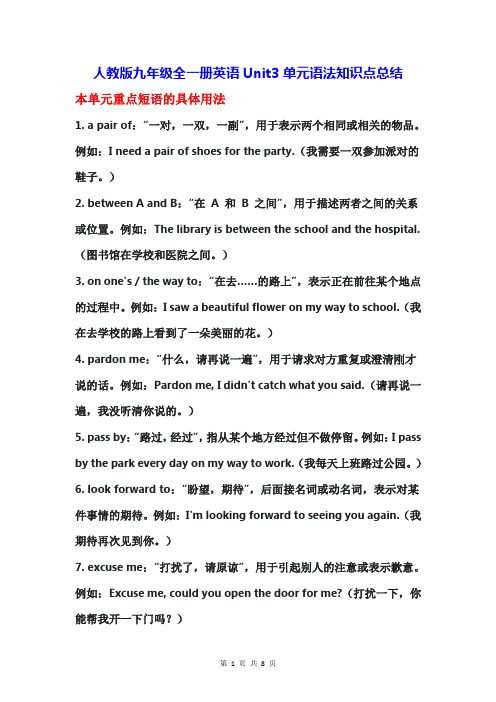
人教版九年级全一册英语Unit3单元语法知识点总结本单元重点短语的具体用法1. a pair of:“一对,一双,一副”,用于表示两个相同或相关的物品。
例如:I need a pair of shoes for the party.(我需要一双参加派对的鞋子。
)2. between A and B:“在A 和B 之间”,用于描述两者之间的关系或位置。
例如:The library is between the school and the hospital.(图书馆在学校和医院之间。
)3. on one's / the way to:“在去……的路上”,表示正在前往某个地点的过程中。
例如:I saw a beautiful flower on my way to school.(我在去学校的路上看到了一朵美丽的花。
)4. pardon me:“什么,请再说一遍”,用于请求对方重复或澄清刚才说的话。
例如:Pardon me, I didn't catch what you said.(请再说一遍,我没听清你说的。
)5. pass by:“路过,经过”,指从某个地方经过但不做停留。
例如:I pass by the park every day on my way to work.(我每天上班路过公园。
)6. look forward to:“盼望,期待”,后面接名词或动名词,表示对某件事情的期待。
例如:I'm looking forward to seeing you again.(我期待再次见到你。
)7. excuse me:“打扰了,请原谅”,用于引起别人的注意或表示歉意。
例如:Excuse me, could you open the door for me?(打扰一下,你能帮我开一下门吗?)8. get some information about:“获取有关……的一些信息”,用于表示获取关于某个主题的信息。
人教版初三英语各单元知识点总结

初三英语各单元知识点详细总结Unit 1一、知识点1.Check in : 在旅馆的登记入住; Check out: 在旅馆结账离开;2.By: ①通过…..方式途径;例:I learn English by listening to tapes.②在…..旁边;例:by the window/the door③乘坐交通工具例:by bus/car④在……之前,到……为止;例:by October在10月前⑤被例:English is spoken by many people.3.how与what的区别:how通常对方式或程度提问,意思有:怎么样如何,通常用来做状语、表语;what通常对动作的发出者或接受者提问,意思为什么,通常做宾语,主语;①How is your summer holiday It’s OK.how表示程度做表语②How did you travel around the world I travel by air.③What do you learn at school I learn English, math and many other subjects.①What…think of… How…like…②What…do with… How…deal with…③What…like about… How…like…④What’s the weather like today How’s the weather today⑤What to do How to do itwhat I should do with how I should deal with it.What do you like about China =How do you like ChinaI don’t know what to do next step =I don’t know how to do it next step㊣What good / bad weather it is todayweather为不可数名词,其前不能加a㊣What a fine / bad day it is today day为可数名词,其前要加a4. aloud, loud与loudly的用法: 三个词都与"大声"或"响亮"有关;①aloud是副词,重点在出声能让人听见,但声音不一定很大,常用在读书或说话上;通常放在动词之后;aloud没有比较级形式;如: He read the story aloud to his son.他朗读那篇故事给他儿子听;②loud可作形容词或副词;用作副词时,常与speak, talk, laugh等动词连用,多用于比较级,须放在动词之后;如:She told us to speak a little louder. 她让我们说大声一点;③loudly是副词,与loud同义,有时两者可替换使用,但往往含有令人讨厌或打扰别人的意思,可位于动词之前或之后;如:He does not talk loudly or laugh loudly in public. 他不当众大声谈笑;5. voice 指人的嗓音也指鸟鸣;sound 指人可以听到的各种声音;noise 指噪音、吵闹声6. find + 宾语+ 宾补名词形容词介词短语分词等例:I find him friendly. I found him working in the garden.We found him in bed. He found the window closed.We found her honest.7. 常见的系动词有:①是:am 、is、are②保持:keep、stay③转变:become、get、turn④ ……起来feel、look、smell、taste、sound8. get + 宾语+宾补形容词过去分词动词不定式使某种情况发生例:Get the shoes clean. 把鞋擦干净Get Mr. Green to come. 让格林先生进来I want to get my bike repaired. 我想去修自行车You can’t get him waiting. 你不能让他老等着9. 动词不定式做定语①与所修饰的名词构成主谓关系The next train to arrive was from New York. He is always the first to come.②与所修饰的名词构成动宾关系I have nothing to say. I need a pen to write with.I need some paper to write on. I don’t have a room to live in.10. practice , fun 做名词为不可数名词11. add 补充说又说12. join 加入某团体并成为其中一员attend 出席参加会议或讲座join in与take part in指参加到某项活动中去;13.all、both、always以及every复合词与not连用构成部分否定;其完全否定为:all---none, both---neither, everything---nothing, everybody---nobody.14. be afraid of doing sth. / sth.害怕be afraid of being alonebe afraid to do sth.害怕be afraid that恐怕担心,表示委婉语气15.either:①放在否定句末表示“也”②两者中的“任一”③either…or…或者…或者.…引导主语部分,谓语动词按照就近原则16plete完成,是个较正式的词,后不能接动名词finish指日常事物的完成17.a,an 与序数词连用表示“又一”,“再一”;例:Please give me a second apple. There comes a fifth girl.18.have trouble/difficult/problem in doing….. 干…..遇到麻烦,困难19.unless 除非,如果不,等于“if not”本身就表示否定,引导条件状语从句,主句为将来时,条件状语从句用一般现在时表示将来;例:My baby sister doesn’t cry unless she’s hungry.=My baby sister doesn’t cry if she isn’t hungry.Unless you take more care, you’ll have an accident.如果你不多加小心的话,你会出事的;20.instead: adv. 代替,更换;例:We have no coffee, would you like tea instead我们没有咖啡了,改喝茶好吗It will take days by car, so let’s fly ins tead.开车去要好几天呢,咱们还是坐飞机吧;Tom was ill, so I went instead.汤姆病了,所以换了我去;instead of doing sth. 作为某人或某事物的替换例:Let’s play cards instead of watching TV.We sometimes eat rice instead of potatoes.Give me the red one instead of the green one.21.spoken 口头的,口语的;spoken English 口头英语speaking 讲话的,说某种语言的;Speaking skills讲英语的能力22. 提建议的句子:①What/ how about +doing sth. 如:What/ How about going shopping②Why don’t you + do sth. 如:Why don’t you go shopping③Why not + do sth. 如:Why not go shopping④Let’s + do sth. 如:Let’s go shopping⑤Shall we/ I + do sth. 如:Shall we/ I go shopping23. a lot 许多常用于句末如:I eat a lot. 我吃了许多;24. too…to 太…而不能常用的句型too+adj./adv. + to do sth.如:I’m too tired to say anything. 我太累了,什么都不想说;25. not …at all 一点也不根本不如:I like milk very much. I don’t like coffee at all.我非常喜欢牛奶;我一点也不喜欢咖啡;not经常可以和助动词结合在一起,at all 则放在句尾26.be / get excited about sth.=== be / get excited about doing sth.=== be excited to do sth. 对…感兴奋如:I am / get excited about going to Beijing.===I am excited to go to Beijing. 我对去北京感到兴奋;27. ① end up doing sth 终止做某事,结束做某事如:The party ended up singing. 晚会以唱歌而结束;② end up with sth. 以…结束如:The party ended up with her singing. 晚会以她的歌唱而告终;28. first of all 首先. to begin with 一开始later on 后来、随29. also 也、而且用于肯定句常在句子的中间either 也用于否定句常在句末too 也用于肯定句常在句末=as well30. make mistakes 犯错mistake sb. for …把……错认为……make mistakes in doing sth. 在干某事方面出错by mistake 错误地;由于搞错mistake---mistook----mistaken如:I often make mistakes. 我经常犯错;I mistook him for his brother.我错把他认成了他的哥哥;make a mistake 犯一个错误如:I have made a mistake.我已经犯了一个错误;31. laugh at sb. 笑话;取笑某人如:Don’t laugh at me不要取笑我32. take notes 做笔记,做记录33. enjoy doing sth . 喜欢做…乐意做… 如:She enjoys playing football. 她喜欢踢足球;enjoy oneself 过得愉快如:He enjoyed himself. 他过得愉快;34. native speaker 说本族语的人35. one of +the+ 形容词比较级+名词复数形式…其中之一如:She is one of the most popular teachers. 她是最受欢迎的教师之一;36. It’s +形容词+for sb. to do sth. 对于某人来说做某事…如:It’s difficult for me to study English.对于我来说学习英语太难了;句中的it 是形式主语,真正的主语是to study English37. practice doing 练习做某事如:She often practice speaking English. 她经常练习说英语;38. decide to do sth. 决定做某事如:LiLei has decided to go to BeiJing . 李雷已经决定去北京;39. deal with 处理如:I dealt with a lot of problem.40. worry about sb./ sth. 担心某人/ 某事如:Mother worried about his son just now. 妈妈刚才担心他的儿子;41. be angry with sb. 对某人生气如:I was angry with her. 我对她生气;42. perhaps === maybe 也许43. go by 时间过去如:Two years went by. 两年过去了;44. see sb. / sth. doing 看见某人正在做某事强调正在发生see sb. / sth. do 看见某人在做某事如:如:She saw him drawing a picture in the classroom.她看见他正在教室里画画;45. each other 彼此46. regard… as … 把…看作为…. 如:The boys regarded Anna as a fool. 这些男孩把安娜看成傻瓜;47. too many许多修饰可数名词如:too many girlstoo much许多修饰不可数名词如:too much milkmuch too太修饰形容词如:much too beautiful48. change…into…将…变为…如:The magician changed the pen into a book. 这个魔术师将这本书变为一本书;49. with the help of sb. == with one’s help 在某人的帮助下如:with the help of LiLei == with LiLei’s help 在李雷的帮助下50. compare … to …把…与…相比如:Compare you to Anna, you are lucky.你和安娜相比,你是幸运的;二、短语:1.by making flashcards 通过做单词抽认卡2. ask…for help 向某人求助3.read aloud 朗读4.that way =in that way 通过那种方式5.improve my speaking skills 提高我的会话技巧6.for example =for instance例如7.have fun 玩得高兴8.have conversations with friends 与朋友对话9.get excited 高兴,激动10.end up speaking in Chinese 以说汉语结束对话11.do a survey about… 做有关…的调查12.keep an English notebook 记英语笔记13.spoken English = oral English 英语口语14.make mistakes 犯错误15.get the pronunciation right 使发音准确16.practise speaking English 练习说英语17.first of all 首先18.begin with 以…开始ter on随后20.in class在课堂上ught at 嘲笑22.take notes 记笔记23.enjoy doing 喜欢干…24.write down 写下,记下25.look up v + adv 查找,查询26.native speakers 说本族话的人27.make up 编造,虚构,化妆,打扮28.around the world 全世界29.deal with 对待,处理,解决30.worry about be worried about 担心,担忧31.be angry with 生某人的气32.stay angry 生气33.go by 消逝34. regard…as… 把…当做…35plain about/of 抱怨36. change…into… 把…变成… = turn into37.with the help of 在…的帮助下38. compare…to with… 把…和…作比较39.think of think about 想起,想到40.physical problems身体上的问题41.break off 中断,突然终止42. not…at all 根本不,全然不三、句子1.How do you study for a test 你怎样为考试做准备2.I have learned a lot that way. 用那种方法,我已经学到了很多东西;3.It’s too hard to understand the voice. 听懂那些声音太难了;4.Memorizing the words of pop songs also helped a little.记流行歌曲的词也起作用;5. Wei Ming feels differently. 卫明有不同的感受;6.He finds watching movies frustrating. 他觉得看电影让人感到沮丧.7.She added that having conversations with friends was not helpful at all.她又说和朋友对话根本没用;8.I don’t have a partner to practice English with.我没有搭档一起练习英语;ter on, I realized that it doesn’t matter if you don’t understand every word.随后,我认识到听不懂每个词并没有关系;10.It’s amazing how much this helped. 我惊异于这些方法竟如此有用;11.My teacher is very impressed. 给老师留下了深刻的印象;12.She had trouble making complete sentences. 她很难造出完整的句子;13.What do you think you are doing 你在做什么14.Most people speak English as a second language.英语对于大多数人来说是第二语言;15.How do we deal with our problem 我们怎样处理我们的问题16.It is our duty to try our best to deal with each challenge in our education with the help of our teachers. 在老师的帮助下尽我们最大的努力来应对挑战是我们的责任;He can’t walk or even speak.他无法走路,甚至无法说话Unit 2一、知识点1. used to 过去常常做某事,暗指现在已经不存在的动作或状态. 后跟动词原形. used to do sth.There used to be ….反意疑问句didn’t there否定形式为: didn’t use to 或usedn’t to疑问形式为: Did…use to… 或Used…to…be/get used to doing sth.习惯于, to 为介词.2. wear 表示状态. =be in +颜色的词put on 表示动作.dress + 人给某人穿衣服.dress sb. / oneselfhave on表示状态不用于进行时态3. on the swim team on 是…的成员,在…供职.4. Don’t you remember me 否定疑问句.考点Yes, I do. 不, 我记得. No, I don’t 是的, 我不记得了.5. 反意疑问句:①陈述部分的主语为this, that, 疑问部分主语用it; 陈述部分主语用these, those, 疑问部分用they 做主语.例: This is a ne w story, isn’t itThose are your parents, aren’t they②陈述部分是there be 结构, 疑问部分仍用there例: There was a man named Paul, wasn’t there③ I am 后的疑问句, 用aren’t I例: I am in Class 2, aren’t I④陈述部分与含有not, no, never, few, little, hardly, seldom, neither, none 等词时,疑问部分用肯定.例: Few people liked this movie, didn’t they但陈述句中若带有否定前缀或后缀的单词时, 这个句子仍视为肯定, 后面仍用否定.例: Your sister is unhappy, isn’t she⑤陈述部分的主语若为不定式或V-ing 短语, 疑问部分主语用it.例: To spend so much money on clothes is unnecessary, isn’t it⑥陈述句中主语是nobody, no one, everyone, everybody 等指人的不定代词时,疑问部分用they做主语;若陈述部分主语是something, anything, noting, everything 等指事物的不定代词时, 疑问部分用it 做主语.例: Nobody says one word about the accident, do theyEverything seems perfect, doesn’t it⑦当主语是第一人称I时, 若谓动为think, believe, guess 等词时, 且其后跟宾丛,这时疑问句部分的人称,时态要与宾语从句保持一致, 同时还要考虑否定转移.例: I don’t think he can finish the work in time, can he⑧前面是祈使句, 后用will you let’s 开头时, 后用shall we6. be terrified of 害怕的程度比be afraid of 深.7. miss: ①思念, 想念例: I really miss the old days.②错过, 未中, 未赶上, 未找到.例: It’s a pity that you miss the bus.The boy shot at the goal, but missed.8. no more 用在句中=not…any more 用在句尾指次数;no longer 用在句中=not…any longer 用在句尾指时间.9. right: ① adj. 正确的, 右边的② n. 右方, 权利③ adv. 直接地.10. It seems that Yu Mei has changed a lot. = Y u Mei seems to have changed a lot.11. afford + n. /pron. afford + to do 常与can, be able to 连用.例: Can you afford a new carThe film couldn’t afford to pay such large salaries.12. as well as 连词, 不但…而且… 强调前者. 若引导主语, 谓动与前者在人称和数上一致例: Living things need air and light as well as water.生命不仅需要水, 还需要空气和阳光.I as well as they am ready to help you.不仅是他们, 我也愿意帮助你.13. alone = by oneself 独自一人. lonely 孤独的, 寂寞的.14. in the last/past + 一段时间during the last/past + 一段时间与现在完成时连用.15. die v. dead adj. death n. dying 垂死的16. play the piano弹钢琴17. ①be/ become interested in sth. 对…感兴趣②be interested in doing sth. 对做…感兴趣③show great interest in 在……方面产生极大的兴趣④a place of interest 一处名胜some places of interest如:He is intere sted in math, but he isn’t interested in speakingEnglish. 他对数学感兴趣,但是他对说英语不感兴趣;⑤ interested adj. 感兴趣的,指人对某事物感兴趣,往往主语是人⑥ interesting adj.有趣的,指某事物/某人具有趣味,主语往往是物⑦ an interesting book / man18. 害怕… be terrified of sth. 如:I am terrified of the dog.be terrified of doing sth. 如:I am terrified of speaking.19. on 副词,表示电灯、电视、机械等在运转中/打开,其反义词off. with the light on 灯开着20. walk to somewhere 步行到某处walk to school 步行到学校21.spend 动词,表示“花费金钱、时间”①spend…on sth. 在某事上花费金钱、时间②spend…doing sth.花费金钱、时间去做某事如:He spends too much time on clothes. 他花费太多的时间在衣着He spend 3 months building the bridge.他花费了三个月去建这座桥;pay for 花费如:I pay 10 yuan for the book. 我花了10元买这本书;take动词有“花费”的意思常用的结构有:It takes sb. … to do sth. 如:It takes me a day to read the book.22. chat with sb. 与某人闲聊如:I like to chat with him.我喜欢和他聊天;23. worry about sb./ sth. 担心某人/某事worry 是动词be worried about sb./sth. 担心某人/某事worried 是形容词如:Don’t worry about him. 不用担心他;Mother is worried about her son. 妈妈担心他的儿子;24. all the time 一直、始终25. take sb. to + 地方送/带某人去某个地方如:A person took him to the hospital. 一个人把他送到了医院;Lui took me home. 刘把我送回了家;home 的前面不能用to26. hardly adv. 几乎不、没有hard 困难的;猛烈地hardly ever 很少hardly 修饰动词时,通常放在助动词、情态动词之后,实义动词之前助动词/情态动词+hardlyhardly + 实义动词如:I can hardly understand them. 我几乎不能够明白他们;I hardly have time to do it. 我几乎没有时间去做了;It rains hard outside, I could hardly go out.27. in the last few years. 在过去的几年内常与完成时连用如:I have lived in China in the last few years. 在过去的几年内我在中国住;28. be different from 与…不同29. how to swim 怎样游泳不定式与疑问词连用:动词不定式可以和what, which, how, where, when 等引导的疑问句连用,构成不定工短语;如:The question is when to start. 问题是什么时候开始;I don’t know where to go. 我不知道去哪;30. make sb./ sth. + 形容词make you happymake sb./ sth. + 动词原形make him laugh31. move to +地方搬到某地如:I moved to Beijing last year.32.It seems that +从句看起来好像……如:It seems that he has changed a lot. 看起来他好像变了许多;33. help sb. with sth. 帮某人某事help sb. to do sth. 帮某人做某事She helped me with English.她帮助我学英语;She helped me to study English;她帮助我学习英语;34. fifteen-year-old 作形容词15岁的fifteen-year-olds 作名词指15岁的人fifteen years old 指年龄15岁如:a fifteen-year-old boy一个15岁的男孩Fifteen-year-olds like to sing. 15岁的人喜欢唱歌;I am fifteen years old . 我是15岁;35.支付不起… can’t /couldn’t afford to do sth.can’t / couldn’t afford sth.如:I can’t/couldn’t afford to buy the car.I can’t/couldn’t afford the car. 我买不起这个辆小车;36. as + 形容词./副词+as sb. could/can 尽某人的…能力如:Zhou run as fast as her could/can. 她尽她最快的能力去跑;37. get into trouble with 遇到麻烦38. in the end 最后39. make a decision 下决定下决心40. to one’s surprise 令某人惊讶如:to their surprise令他们惊讶to Li Lei’s surprise令李雷惊讶41. take pride in sth. 以…而自豪如:His father always take pride in him. 他的爸爸总是以他而自豪42. pay attention to sth. 对…注意,留心如:You must pay attention to your friend. 你应该多注意你的朋友;43. be able to do sth. 能做某事如:She is able to do it. 她能够做到;44. give up doing sth. 放弃做某事如:My father has given up smoking. 我爸爸已经放弃吸烟了;复合句与简单句的转化:①when ------ at the age of …②so…that…----- too… to…. / enough to …③so that…------ in order to do sth.④because…----- because of…⑤if ….----- without / with…⑥if…----- 祈使句+ and / or + 简单句⑦宾语从句----特殊疑问词+动词不定式⑧be afraidbe sure that +从句---- 动词不定式be sorry⑨It seems / seemed that sb….------ sb. seems / seemed to do sth.⑩Sb. hopes / hoped that ….-------sb. hopes / hoped to do sth.二、短语1. be more interested in 对…更感兴趣.2. on the swim team 游泳队的队员.3. be terrified of 害怕.4. gym class 体操课.5. worry about. 担心.6. all the time 一直, 总是7. chat with 与…闲聊8. hardly ever 几乎从不9. walk to school = go to school on foottake the bus to school = go to school by bus10. as well as 不仅…而且11. get into trouble 遇到麻烦12. make a decision 做出决定13. to one’s surprise 使某人吃惊的是14. take pride in 为…感到骄傲15. pay attention to 留心, 注意16. consist of 由…组成/构成. be made up of 由…组成/构成.17. instead of 代替, 而不是18. in the end 最后, 终于19. play the piano 弹钢琴三、句子1.I used to be afraid of the dark. 我以前害怕黑暗.2.I go to sleep with my bedroom light on. 我开着卧室的灯睡觉.3.I used to spend a lot of time playing games with my friends. 以前我常常花很多时间和我的朋友们玩游戏.4.I hardly ever have time for concerts. 我几乎没有时间去听音乐会.5.My life has changed a lot in the last few years.6.It will make you stressed out. 那会使你紧张的.7.It seems that Yu Mei has changed a lot. 玉梅似乎变化很大.Unit 3一、知识点①英语有两种语态:主动语态和补动语态主动语态表示是动作的执行者被动语态表示主语是动作的承受者Cats eat fish. 主动语态猫吃鱼;Fish is eaten by cats.被动语态鱼被猫吃;②被动语态的构成由“助动词be +及物动词的过去分词”构成助动词be 有人称、数和时态的变化,其变化规则与be 作为连系动词时完全一样;时态被动语态结构例句一般现在时amare +过去分词isEnglish is spoken inmany countries.一般过去时was +过去分词were + 过去分词This bridge was built in1989.情态动词can/shouldmay +be+过去分词must/……The work must be doneright now.③被动语态的用法当我们不知道谁是动作的执行者,或者没有必要指出谁是动作的执行者,或者只需强调动作的承受者时,要用被动语态;2. allow sb. to do sth. 允许某人做某事主动语态如:Mother allows me to watch TV every night. 妈妈允许我每晚看电视;be allowed to do sth. 被允许做某事被动语态如:LiLy is allowed to go to Qinzhou. 莉莉被允许去钦州;3. get their ears pierced 穿耳洞让/使别人做某事get sth. done过去分词have sth. done 如:I get my car repaired. == I have my car repaired. 我让别人修好我的车I want to have my hair cut. 我要理发.4. enough 足够形容词+enough 如:beautiful enough足够漂亮enough+名词如:enough food 足够食物enough to 足够…去做…如:I have enough money to go to Beijing. 我有足够的钱去北京;She is old enough to go to school.她够大去读书了;5. stop doing sth. 停止做某事Please stop speaking.请停止说话;stop to do sth. 停止下来去做某事Please stop to speak. 请停下来说话;6. 看起来好像…sb. s eem to do sth. = It seems that +从句He seems to feel very sad.It seems that he feels very sad. 他看起来好像很伤心;7.倒装句:由so+助动词be/do/will/have/情态动词+主语意为:…也是一样Neither/Nor + be动词/助动词/情态动词+主语前为否定表示与前面所述事实一致.She is a student. So am I.她是一个学生,我也是;She went to school just now. So did I . 她刚才去学校了,我也是She has finished the work. So have I . 她已经完成了工作,我也完成了;She will go to school. So will he.她将去学校,他也是;Tom can’t swim. Neither can John.8. yet 仍然,还常用在否定句或疑问句当中可与although/though连用9. stay up 熬夜如:I often stay up until 12:00pm.我经常熬夜到12点;10. clean up 打扫整理如:I have cleaned up the bedroom. 我已经打扫完了卧室;11. 程度副词:always总是usually经常sometimes有时never从不如:I am always/usually/sometimes/never late for school.我总是/经常/有时/从不上学迟到;12. 曾经做某事:Do you eve r get to school late Yes, I do. No, I don’t.Have you ever got to school late Yes, I have. No, I haven’t.13. go shopping去购物, go fishing去钓鱼go swimming去游泳, go boating去划船go hiking去登山, go trekking去徒步14. .be strict with+人. be strict in+事物.例: The head teacher is strict with his studentsHe is strict in the work.15. take the test 参加考试pass the test 通过考试fail a test 考试失败16. the other day前几天,不久前的一天.用于过去时every other day = every two days 每隔一天每两天17. agree 同意反义词disagree不同意动词agreement 同意反义词disagreement 不同意名词18. keep sb/ sth. +形容词使某人/某物保持….如:We should keep our city clean.cleaningⅹ我们应该保持我们的城市干净;Don’t keep me waiting for a long time.别让我等得太久;19. both…and…+动词复数形式如:Both Jim and Li Ming play basketball.20. learn sth. from sb. 向谁学习什么如:Jim learnt English from his English teacher. 吉姆向他的英语老师学习英语21. have an opportunity to do sth. 有机会做某事have a chance of doing sth. 有机会做某事如:I have an opportunity to go to Beijing. I have a chance of going to Beijing.22. at present 目前23. at least 最少at most 最多24. 花费take ,cost, spend , payIt take sb. time to do sth. It took me 10days to read the book.sth. cost sb. …… The book cost me 100yuan.sb. spend … on sth. She spent 10day s on this book.sb. spend …doing sth. She spent 10days reading this book.sb. pay … for sth. She paid 10yuan for this book.25. have +时间段+off 放假,休息如:have 2 days offoff 不工作,不上班,不上学,不值班.例: I think I’ll take the afternoon off. 我想下午歇班.She is off today. 她今天休息.I have three days off next week. 下周我有三天假.They haven’t had a day off since last week. 从上周来,他们没休息过一天.26. reply to 答复某人如:She replayed to MrGreen.27. agree with sth. 同意某事如:I agree with that idea.agree to sb. 同意某人的意见如:I agree to LiLei.28. get in the way of 碍事,妨碍如:Her social life got in the way of her studies. 她的社会生活妨碍了她的学习;29. success n. succeed v. successful adj. successfully adv.30. think about 与think of 的区别①当两者译为:认为、想起、记着时,两者可互用I often think about/ of that day. 我经常想起那天;②think about 还有“考虑”之意,think of 想到、想出时两者不能互用At last, he thought of a good idea. 最后他想出了一个好主意;We are thinking about going Qinzhou. 我们正在考虑去钦州;31. 对… 热衷, 对…兴趣be serious about doing 如:She is serious about dancing. 她对跳舞热衷;be serious about sth. 如:She is serious about him. 她对他感兴趣;32. practice doing 练习做某事She often practice speaking English.33. care about sb. 关心某人如:Mother often care about her son.34. also 也用于句中either也用于否定句且用于句末too=as well 也用于肯定句且用于句末I am also a student. 我也是一个学生I am a student too. 我也是一个学生;I am not a student either. 我也不是一个学生;35.allow sb to do sth 允许某人做… allow doing sth 允许做…36.stupid silly foolish 三个词都有“蠢”的意思.但略有不同.stupid 程度最强,指智力理解力学习能力差. silly 指头脑简单,傻头傻脑,使人觉得可笑,带有感情色彩. foolish 尤其在口语中广泛使用.例: He is stupid in learning math. 他学习数学很笨.Stop asking such silly questions. 别再问这样傻的问题了.You are foolish to throw away such a good chance.你真蠢,丢掉这样一个好机会.37.He doesn’t seem to have many fri ends.=It seems that he doesn’t have many friends.=He seems not to have many friends.38.clean v. 打扫,清理clean up 比较彻底地打扫,清理clean out 打扫,清理地最彻底.39.concentrate on… 全神贯注做…例: He decided to concentrate on physics because he failed the exam.This company concentrates on China market.这家公司把重点放在中国市场上.40. more…than…①与其说…不如说…; 比…更…例: The man is more stupid than nervous.与其说那人紧张,倒不如说他愚蠢.②在这一结构中,more做adj. 修饰名词,表示“比…多”例:I have more books than you. 我的书比你的多.41.volunteer ① n. 自愿者. ② v. volunteer to do sth. 自愿做…例: We all volunteered to help in the old people’s home.我们都志愿到敬老院帮忙.42. get in the way of... 妨碍...例: He never gets in others’ way. 他从不妨碍别人.The bikes over there will get in the way of others. 自行车放在那里会妨碍别人的.43. success n. successful adj. succeed v.44. only 处于句首,并后跟状语时,全句需要倒装.例: Only then did he understand it. 只有到那时,他才明白.Only in this way can we learn English well. 只有这样我们才能把英语学好.Only when she came home, did he learn the news. 当她到家时,他才得知了这消息.45. care about 关心,在乎,在意.例: No one cares about others nowadays. 现在没人关心别人.I don’t care about what he does. 我并不在意他干什么.二、短语1. be allowed to do sth 被允许干…allow sb to do sth 允许某人干…allow doing sth 允许干…2. sixteen-year-olds = sixteen-year-old boys and girls 16岁的孩子3. part-time jobs 兼职工作4. a driver’s license 驾照5. on weekends 在周末6. at that age 在那个年龄段7. on school nights 在上学期间的每个晚上8. stay up 熬夜9. clean up 相当与及物动词清扫10. fail in a test 考试不及格11. take the test 参加考试12. the other day 前几天13. all my classmates 我所有的同学14. concentrate on 全神贯注于15. be good for 对…有益16. in groups 成群的,按组的17. get noisy 吵闹系表结构18. learn from 向某人学习19. at present 目前,现在20. have an opportunity to do sth 有做…的机会21.English-English dictionary 英英词典22. at least 至少23.eight hours’ sleep a night 每晚8小时的睡眠24. an old people’s home 敬老院25. take time to do sth 花费时间干…26. primary schools 小学27. have…off 放假,休息28. reply to 回答,答复29. get in the way of 妨碍30. a professional athlete 职业运动员31. achieve one’s dreams 实现梦想32. think about 思考,考虑33. in the end 最后,终于34. be serious about 对…热忠/极感兴趣35. spend…on + n. spend …in + v-ing 在…上花费时间/金钱36. care about 关心,担心,在乎37. agree with 同意…三.句子1. I don’t think twelve-year-olds should be allowed to get their ears pierced.我认为不应该允许12岁的孩子穿耳孔.2.They talk instead of doing homework. 他们聊天而不是做作业.3.He is allowed to stay up until 11:00 pm. 允许他们熬到晚上11点.4.We should be allowed to take time to do things like that more often.我们应该被允许更加经常的花些时间多做这类事情.5.What school rules do you think should be changed你认为学校的哪些制度应该改一改了6.The two pairs of jeans both look good on me.这两条牛仔裤穿在我身上都适合.7.The classroom is a real mess. 教室太脏了.8.Should I be allowed to make my own decisions9.Only then will I have a chance of achieving my dream.只有这样我才能实现我的梦想.10.They should be allowed to practice their hobbies as much as they want.应该允许他们对业余爱好想练多长时间就练多长时间.11.We have nothing against running. 我们没有理由反对他跑步.Unit 4一、知识点1. if 引导的非真实性条件状语从句即虚拟语气通过动词形式的变化来表示说话人对发生的动作或存在的状态所持的态度或看法的动词形式称为语气,虚拟语气表示说话人所说的。
最新人教版|九年级英语全册各单元必考知识点大全

人教版|九年级全册各单元必考知识点大全Unit1【重点短语】1. have conversation with sb. 同某人谈话2. too…to…太……而不能3. the secret to………的秘诀4. be afraid of doing sth./ be afraid to do sth. 害怕做某事5. look up 查阅6. repeat out loud 大声跟读7. make mistakes in 在……方面犯错误8. connect ……with…把……和……连接/联系起来9. get bored 感到厌烦10. be stressed out 焦虑不安的11. pay attention to 注意;关注12. depend on 取决于;依靠13. the ability to do sth.. 做某事的能力【考点详解】1. by + doing 通过……方式(by是介词,后面要跟动名词,也就是动词的ing 形式)2. talk about 谈论,议论,讨论The students often talk about movie after class. 学生们常常在课后讨论电影。
talk to sb= talk with sb 与某人说话3. 提建议的句子:①What/ how about +doing sth.? 做…怎么样?(about后面要用动词的ing形式,这一点考试考的比较多)如:What/ How about going shopping?②Why don't you + do sth.? 你为什么不做…?如:Why don't you go shopping?③Why not + do sth. ? 为什么不做…?如:Why not go shopping?④Let's + do sth. 让我们做…...吧。
如:Let's go shopping⑤Shall we/I + do sth.? 我们/我...…好吗?如:Shall we/I go shopping?4. a lot 许多,常用于句末。
(完整版)人教版九年级全一册英语知识点归纳.docx

PEP 九年英知点Unit 1 How can we become good learners?重点: 1.学并掌握用how 来做某事的方式; 2.学并掌握by+ving 来表达做某事的方法。
点:名在句中充当的成分。
知点:ask for help 求帮助work with sb. 和⋯⋯一起工作have conversation with 和⋯⋯一起main idea 中心思想the secret to ⋯⋯的秘word by word 逐字take time 花word groupbody language 肢体言expressions on faces上的表情key words 关as well 也look up 看take notes 笔practice doing sth. 做某事pen pal 笔友keep a diary 日make mistakes 犯increase 增加;提高decrease 减少;降低practice with sb. 和⋯⋯一起depend on 依whether or not 是否pay attention to sth. / doing sth. 注意某事 /做某事for a long time 很一段connect ⋯ with ⋯把⋯⋯和⋯⋯接起来write down 写下mind map 思lifelong journey 身的旅程on one ’ s own独自地bit by bit 一点点at once 上,立刻It ’ s a piece of cake小.菜一碟。
It serves you right. 你活。
Use it or lose it.Practice makes perfect.Unit 2 I think that mooncakes are delicious!重点 & 点: 1. that, if whether 引的从句; 2. 感句的学和运用。
人教版九年级英语各全一册单元重点
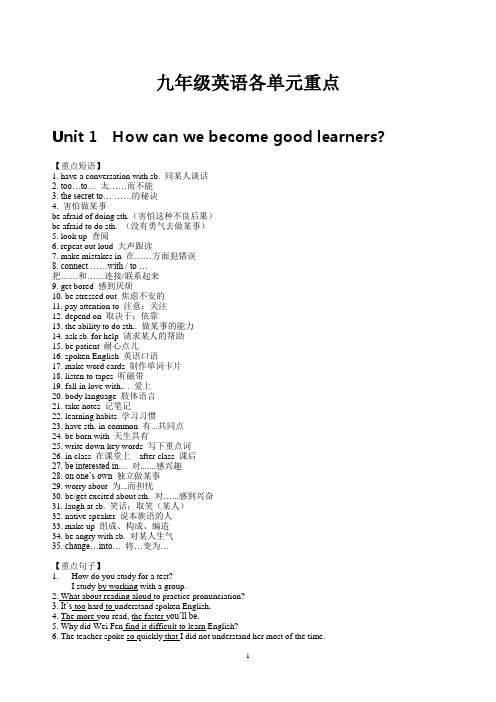
九年级英语各单元重点Unit 1 How can we become good learners? 【重点短语】1. have a conversation with sb. 同某人谈话2. too…to… 太……而不能3. the secret to… ……的秘诀4. 害怕做某事be afraid of doing sth.(害怕这种不良后果)be afraid to do sth. (没有勇气去做某事)5. look up 查阅6. repeat out loud 大声跟读7. make mistakes in 在……方面犯错误8. connect ……with / to …把……和……连接/联系起来9. get bored 感到厌烦10. be stressed out 焦虑不安的11. pay attention to 注意;关注12. depend on 取决于;依靠13. the ability to do sth.. 做某事的能力14. ask sb. for help 请求某人的帮助15. be patient 耐心点儿16. spoken English 英语口语17. make word cards 制作单词卡片18. listen to tapes 听磁带19. fall in love with.. . 爱上20. body language 肢体语言21. take notes 记笔记22. learning habits 学习习惯23. have sth. in common 有...共同点24. be born with 天生具有25. write down key words 写下重点词26. in class 在课堂上after class 课后27. be interested in… 对.......感兴趣28. on one’s own 独立做某事29. worry about 为...而担忧30. be/get excited about sth. 对…...感到兴奋31. laugh at sb. 笑话;取笑(某人)32. native speaker 说本族语的人33. make up 组成、构成、编造34. be angry with sb. 对某人生气35. change…into… 将…变为…【重点句子】1. --- How do you study for a test?--- I study by working with a group.2. What about reading aloud to practice pronunciation?3. It’s too hard to understand spoken English.4. The more you read, the faster y ou’ll be.5. Why did Wei Fen find it difficult to learn English?6. The teacher spoke so quickly that I did not understand her most of the time.7. Although I couldn’t understand everything the characters said, their body language and the expressions on their faces helped me to get the meaning.8. I could get the meaning by listening for the key words.9. I want to learn new words and more grammar so that I can have a better understanding of English movies.10. I don’t know how to increase my reading speed.11. I don’t have a partner to practice English with.12. He can’t get the pronunciation right.13. Everyone is born with the ability to learn.14. But whether or not you can do this well depends on your learning habits15. It is also easier for you to pay attention to it for a long time.16. Good learners often connect what they need to learn with something interesting.17. Even if you learn something well, you will forget it unless you use it.18. Good learners will keep practicing what they have learned, and they are not afraid of making mistakes.19. They may take notes by writing down key words or by drawing mind maps.20. Remember to take notes in class and review them on your own or with friends after class.重点句子解读:1. I study by working with a group.请仔细观察下面的例句,分析by的用法,然后补全结论部分所缺的内容。
人教版初中英语九年级全册各单元知识点、语法归纳整理
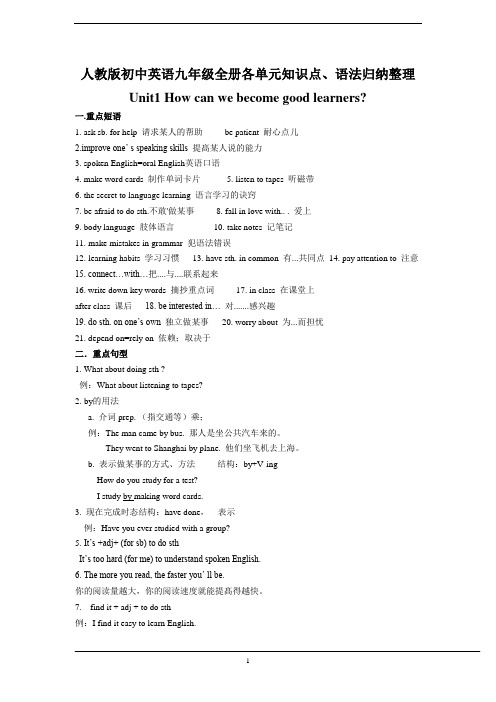
人教版初中英语九年级全册各单元知识点、语法归纳整理Unit1 How can we become good learners?一.重点短语1. ask sb. for help 请求某人的帮助be patient 耐心点儿2.improve one’ s speaking skills 提髙某人说的能力3. spoken English=oral English英语口语4. make word cards 制作单词卡片5. listen to tapes 听磁带6. the secret to language learning 语言学习的诀窍7. be afraid to do sth.不敢'做某事8. fall in love with.. . 爱上9. body language 肢体语言10. take notes 记笔记11.make mistakes in grammar 犯语法错误12.learning habits 学习习惯13. have sth. in common 有...共同点14. pay attention to 注意15. connect…with…把....与....联系起来16. write down key words 摘抄重点词17. in class 在课堂上after class 课后18. be interested in… 对.......感兴趣19. do sth. on one’s own 独立做某事20. worry about 为...而担忧21. depend on=rely on 依赖;取决于二.重点句型1. What about doing sth ?例:What about listening to tapes?2.by的用法a. 介词 prep. (指交通等)乘;例:The man came by bus. 那人是坐公共汽车来的。
人教版九年级英语全册知识点归纳
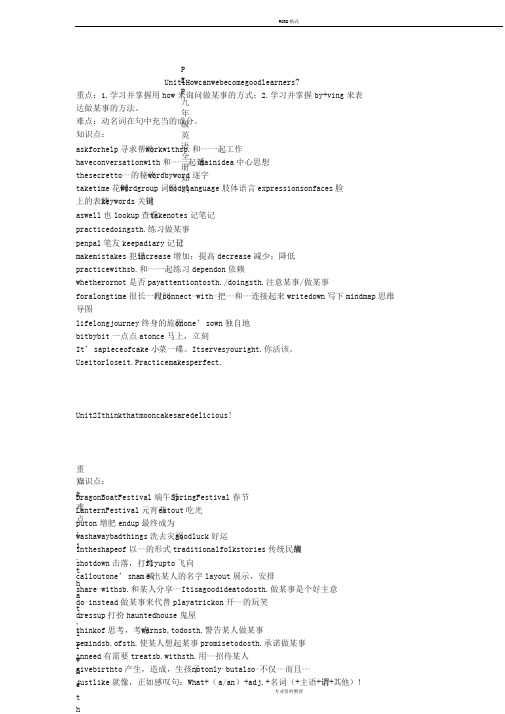
P E P 九年级英语全册知纳 Unit1Howcanwebecomegoodlearners? 重点:1.学习并掌握用how 来询问做某事的方式;2.学习并掌握by+ving 来表 达做某事的方法。
难点:动名词在句中充当的成分。
知识点: askforhelp 寻求帮助w orkwithsb.和⋯⋯一起工作 haveconversationwith 和⋯⋯一起对话mainidea 中心思想thesecretto ⋯⋯的秘诀w ordbyword 逐字 taketime 花时间w ordgroup 词组b odylanguage 肢体语言expressionsonfaces 脸上的表情k eywords 关键词aswell 也lookup 查看t akenotes 记笔记 practicedoingsth.练习做某事 penpal 笔友keepadiary 记日记makemistakes 犯错i ncrease 增加;提高decrease 减少;降低 practicewithsb.和⋯⋯一起练习dependon 依赖whetherornot 是否payattentiontosth./doingsth.注意某事/做某事foralongtime 很长一段时间c onnect ⋯with ⋯把⋯⋯和⋯⋯连接起来writedown 写下mindmap 思维导图lifelongjourney 终身的旅程o none ’sown 独自地 bitbybit 一点点atonce 马上,立刻It ’sapieceofcake 小.菜一碟。
Itservesyouright.你活该。
Useitorloseit.Practicemakesperfect.Unit2Ithinkthatmooncakesaredelicious!重点&难点:1.that,if知识点:DragonBoatFestival 端午节S pringFestival 春节 LanternFestival 元宵节e atout 吃光 puton 增肥endup 最终成为 washawaybadthings 洗去灾祸g oodluck 好运intheshapeof 以⋯⋯的形式traditionalfolkstories 传统民间故事 shotdown 击落,打垮f lyupto 飞向 calloutone ’snam 喊e 出某人的名字layout 展示,安排 share ⋯withsb.和某人分享⋯⋯Itisagoodideatodosth.做某事是个好主意 do ⋯instead 做某事来代替playatrickon 开⋯⋯的玩笑 dressup 打扮hauntedhouse 鬼屋 thinkof 思考,考虑w arnsb,todosth.警告某人做某事 remindsb.ofsth.使某人想起某事promisetodosth.承诺做某事1Unit3Couldyoupleasetellmewheretherestroomare?重点:学习并掌握wh-&how 所引导的宾语从句。
人教版九年级英语第九单元知识点总结

人教版九年级英语第九单元知识点总结
人教版九年级英语第九单元的知识点总结如下:
1. 词汇和短语:
用法:掌握并能够正确使用本单元所学的词汇和短语,包括它们的拼写、发音和用法。
扩展:通过阅读、写作和听力练习,进一步加深对词汇和短语的掌握。
2. 语法:
现在完成时态:掌握现在完成时态的基本用法,了解其与一般过去时的区别。
常用表达方式:熟悉并掌握一些常用的表达方式,如“so far”、“up to now”、“in the past few years”等。
3. 课文理解:
主题:理解本单元课文的主题,了解不同国家的文化习俗和传统。
细节:能够准确提取课文中的关键信息,理解文章的基本结构和逻辑关系。
4. 口语练习:
常用表达:通过模仿和练习,能够流利地使用本单元所学的日常用语和表达方式。
情景对话:能够在不同的情境下进行有效的交流和沟通,提高口语交际能力。
5. 写作练习:
段落结构:了解并掌握段落的基本结构,能够写出结构清晰、逻辑严谨的段落。
写作技巧:学习并运用一些常用的写作技巧,如转折、因果、比较等,提高写作水平。
6. 听力练习:
听力理解:通过听录音、看视频等方式,提高听力理解能力。
信息提取:能够从听力材料中提取关键信息,并进行归纳总结。
7. 阅读练习:
阅读技巧:掌握一些常用的阅读技巧,如略读、寻读、精读等,提高阅读速度和理解能力。
扩展阅读:通过课外阅读等方式,了解更多不同国家和地区的文化传统和习俗。
人教版九年级英语下册各单元知识点归纳总结

人教版九年级英语下册全册各单元必考知识点目录Unit7 知识要点梳理 (2)【重点短语】 (2)【重点句型】 (3)【考点详解】 (4)【重点语法】 (6)Unit8 知识要点梳理 (8)【重点短语】 (8)【重点句型】 (8)【考点详解】 (9)【重点语法】 (12)Unit9 知识要点梳理 (12)【重点短语】 (12)【重点句型】 (13)【考点详解】 (14)Unit10 知识要点梳理 (16)【重点短语】 (16)【重点句型】 (16)【考点详解】 (17)Unit11 知识要点梳理 (21)【重点短语】 (21)【重点句型】 (21)【考点详解】 (22)Unit12 知识要点梳理 (25)【重点短语】 (25)【重点句型】 (25)【考点详解】 (26)【重点语法】 (28)Unit13 知识要点梳理 (30)【重点短语】 (30)【重点句型】 (31)【考点详解】 (31)【重点语法】 (33)Unit14 知识要点梳理 (36)【重点短语】 (36)【重点句型】 (37)【考点详解】 (38)Unit7 知识要点梳理【重点短语】1. be allowed to do sth. 被允许做某事allow sb. to do sth. 允许某人做某事allow doing sth. 允许做某事2. sixteen-year-olds = sixteen-year-old boys and girls 16岁的孩子3. part-time jobs 兼职工作4. a driver’s license 驾照5. on weekends 在周末6. at that age 在那个年龄段7. on school nights 在上学期间的晚上8. stay up 熬夜9. clean up 清扫10. fail(in)a test 考试不及格11. take the test 参加考试12. the other day 前几天13. all my classmates 我所有的同学14. concentrate on 全神贯注于15. be good for 对…...有益16. in groups 成群的,按组17. get noisy 变得吵闹(系表结构)18. learn from 向......学习19. at present 目前,现在20. have an opportunity to do sth. 有做……的机会【重点句型】1. I don’t think twelve-year-olds should be allowed to get their ears pierced.我认为不应该允许12岁的孩子穿耳孔。
Units1-2单元高频考点总结2024-2025学年人教版英语九年级全册

九全1-2单元1.-How do you study for a test?你如何为考试而学习?-I study by working with a group.我通过小组合作学习。
知识点:询问及回答做事方式的句型1)对方式状语提问,用疑问词how.2)by doing...结构中,介词by意为“通过”,其后接动名词(短语),构成介词短语,作状语,常用来表达做某事的方式。
by意为“通过,以……的方式”。
后面接动名词或名词。
接交通工具时名词前不用冠词with意为“用,拿着,与……一起”。
后面可接表示工具或人物或身体部位的名词in意为“用”。
接表示语言或颜色的名词2.I 've put on five pounds!我已经胖了5磅了!知识点:put on 增加(体重);发胖1)put on的三种含义①增加(体重);发胖②穿上;戴上③上演2)put on 是动副短语,若其宾语是名词时,放在put与on的中间或其后面,若其宾语是代词时,放在put与on的中间。
【拓展延伸】常见由put构成的其他短语1)put up张贴;挂起;搭建2)put off 推迟;拖延3)put out熄灭;扑灭4)put away放好;收好3.One Christmas Eve, Scrooge sees the ghost of Jacob Marley, his dead business partner.有一年的圣诞前夜,斯克鲁奇见到了他已故的生意伙伴雅各布·马利的灵魂。
dead形容词,表示“死的;无生命的”。
die不及物动词,表示“死、死亡”。
dying die的现在分词,也可作形容词,表“垂死的,濒于死亡边缘的,枯萎的”之意。
death名词,表示“死、死亡”。
【温馨提示】die是非延续性动词,不能与表示一段时间的时间状语连用。
4.He warns Scrooge to change his ways if he doesn’t want to end up like him.他警告斯克鲁奇如果不想落到和他一样的下场的话就要改变他的方式。
人教版九年级全一册各单元的重点短语及语法知识点汇总
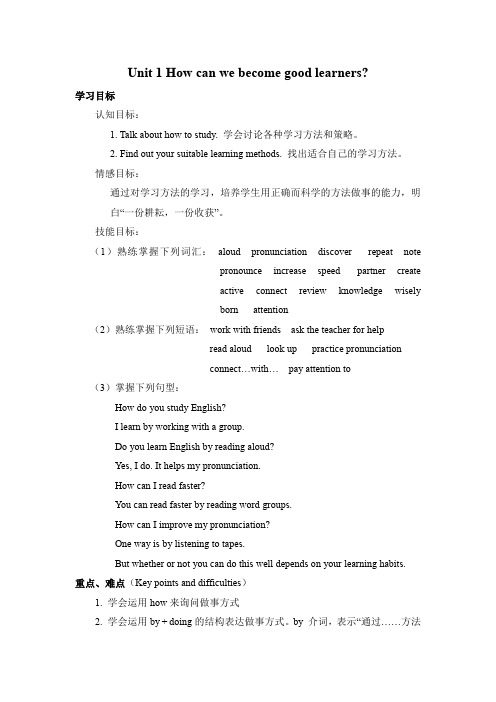
Unit 1 How can we become good learners?学习目标认知目标:1. Talk about how to study. 学会讨论各种学习方法和策略。
2. Find out your suitable learning methods. 找出适合自己的学习方法。
情感目标:通过对学习方法的学习,培养学生用正确而科学的方法做事的能力,明白“一份耕耘,一份收获”。
技能目标:(1)熟练掌握下列词汇:aloud pronunciation discover repeat notepronounce increase speed partner createactive connect review knowledge wiselyborn attention(2)熟练掌握下列短语:work with friends ask the teacher for helpread aloud look up practice pronunciationconnect…with… pay attention to (3)掌握下列句型:How do you study English?I learn by working with a group.Do you learn English by reading aloud?Yes, I do. It helps my pronunciation.How can I read faster?You can read faster by reading word groups.How can I improve my pronunciation?One way is by listening to tapes.But whether or not you can do this well depends on your learning habits.重点、难点(Key points and difficulties)1. 学会运用how来询问做事方式2. 学会运用by + doing的结构表达做事方式。
九年级英语1-3单元知识点人教版

九年级英语1-3单元知识点人教版Unit 1 How can we become good learners?一、重点单词。
1. textbook:n. 教科书;课本。
2. conversation:n. 交谈;谈话。
3. aloud:adv. 大声地;出声地(区别于loud,loud可作形容词或副词,侧重声音响亮;aloud强调出声,能让人听见)4. pronunciation:n. 发音;读音。
5. sentence:n. 句子。
6. patient:adj. 有耐心的;n. 病人(be patient with sb. 对某人有耐心)7. expression:n. 表达(方式);表示。
8. discover:v. 发现;发觉(指发现原本存在但不为人知的事物)9. secret:n. 秘密;秘诀;adj. 秘密的;保密的(the secret to... ……的秘诀)10. look up:查阅;抬头看(look up a word in the dictionary在字典里查单词)二、重点短语。
1. by working with friends:通过和朋友一起学习。
2. make word cards:制作单词卡片。
3. read aloud:大声朗读。
4. practice doing sth.:练习做某事。
5. be afraid to do sth.:害怕做某事(be afraid of doing sth. 担心会发生某事)6. fall in love with:爱上;与……相爱。
7. as well:也(用于肯定句末,相当于too)8. look up to:钦佩;仰慕。
9. take notes:记笔记。
10. make mistakes in:在……方面犯错误。
三、重点句型。
1. How do you study for a test? 你如何为考试而学习?- I study by listening to tapes. 我通过听磁带学习。
- 1、下载文档前请自行甄别文档内容的完整性,平台不提供额外的编辑、内容补充、找答案等附加服务。
- 2、"仅部分预览"的文档,不可在线预览部分如存在完整性等问题,可反馈申请退款(可完整预览的文档不适用该条件!)。
- 3、如文档侵犯您的权益,请联系客服反馈,我们会尽快为您处理(人工客服工作时间:9:00-18:30)。
unit1Howcanwebecomegoodlearners?必背单词aloud大声地出声地patient有耐心的病人discover发现pronounce[pr??na?ns]v.发音pronunciation[pr??n?nsi?e??n]n.发音ability能力才能active活跃的积极的expression表情,表示表达方式secret秘密秘诀adj秘密的保密的increase增加增长knowledge知识学问短语归纳workwithfriends和朋友一起学习listentotapes听磁带studyforatest备考haveconversationswith与……交谈speakingskills口语技巧alittle有点儿atfirst起初起先thesecretto......,.......的秘诀becauseof因为aswell也lookup(在词典中等)查阅;抬头看sothat以便,为了themeaningof……的意思makemistakes犯错误talkto交谈dependon依靠依赖incommon共有的payattentionto注意关注connect……with……,把……和……联系或连接起来forexample例如thinkabout考虑evenif即使尽管纵容lookfor寻找findout找到查明worryabout担心担忧makewordcards制作单词卡片asktheteacherforhelp向老师求助readaloud大声读spokenenglish英语口语giveareport作报告wordbyword一字一字地so……that如此……以至于fallinlovewith爱上somethinginteresting有趣的事情takenotes记笔记howoften多久一次alotof许多theabilitytodosth.做某事的能力learninghabits学习习惯beinterestedin对……感兴趣getbored感到无聊begoodat在……方面擅长beafraidof害怕eachother彼此互相insteadof代替而不是用法集萃bydoingsth通过做某事it+be+adj+todosth做某事是……的finishdoingsth完成某事whataboutdoingsth?做某事怎么样?trytodosth尽力做某事the+比较近,the+比较近越……,就越……findit+adj+todosth发现做某事beafraidofdoingsth害怕做某事helpsb(to)dosth帮助某人做某事practicedoingsth练习做某事keepdoingsth一直做某事beafraidtodosth害怕做某事begintodosth开始做某事wanttodosth想要做某事needtodosth需要做某事remembertodosth记得做某事shoot射(射着,射死等表结果)shootat(瞄准)射语法全解一、how询问方式、方法,意为“怎样、如何”。
回答这种问句时常用by短语或by后接动词-ing形式,表示“凭借……交通工具”或“用……方式、手段”。
有时也用on短语表示交通方式。
二、现在完成时现在完成时的用法:1、含义:表示过去发生的动作对现在造成了影响或产生了结果,一般含有“已经”的含义。
2、结构:have/has+动词的过去分词3、标志词:already,yet,since,for三、连系动词(系动词)一是(be),一感(feel),一保持(keep),起来四个(sound,look,smell,taste),好像(seem)变了仨(get,turn,become)。
unit2Ithinkthatmooncakesaredelicious!必记单词mooncake月饼relative亲属亲戚lay放置安放产(卵)下(蛋)tie领带v捆束liev存在平躺处于business生意商业stranger陌生人steal偷窃取admire欣赏仰慕C hristmas圣诞节dead死的present现在礼物adj现在的短语归纳puton增加(体重)发胖careabout关心在乎endup最终成为,最后处于notonly……butalso……不但……而且……shootdown射下usedtodo过去常常做……remindsb.of使某人想起giveout分发发放thewaterfestival泼水节theChinesespringfestival中国春节nextyear明年soundlike听起来像eachother互相彼此intheshapeof以……的形状onmid-autumnnight在中秋之夜flyupto飞向layout摆开布置comeback回来asaresult结果因此mother’sday母亲节moreandmorepopular越来越受欢迎thinkof想起认为思考dressup装扮穿上盛装theimportanceof……的重要性makemoney挣钱inneed需要帮助处于困境中between……and……在……和……之间thedragonboatfestival龙舟节thelanternfestival元宵节likebest最喜欢goto……foravacation去……度假besimilarto与……相似washaway冲走洗掉mid-autumnfestival中秋节shootdown射下callout大声呼喊thetraditionof……的传统atnight在夜里在晚上one……,theother……一个……,另一个……Father’sday父亲节haveto必须不得不playatrickonsb捉弄某人thespiritof……的精神careabout关心wakeup醒来thebeginningof……的开始用法集萃1.感叹句式一:What+(a/an)+adj+名词(+主语+谓语+其他)!多么……的……感叹句式二:How+adj/adv+主语+谓语+其他!……多么……!2.begoingto……将要/打算……3.in+时间段在……后4.givesb.sth.给某人某物5.plantodosth计划做某事6.refusetodosth拒绝做某事7.oneof+名词复数形式……之一8.it+is+名词+动词不定式(todosth)做某事是……9.what……thinkof……?…认为…怎么样?10.makesbdosth让某人做某事edtobe过去是……12.warnsb(not)todosth告诫某人做某事13.tellsb(not)todosth告诉某人做某事14.decidetodosth决定做某事15.promisetodosth承诺、答应做某事语法全解一.宾语从句:是指在主句中充当宾语成分的从句。
1、引导词:that(无实义),whether/if(是否),who/what/where等特殊疑问词。
2、语序:宾语从句中要用陈述语序,即主语在be动词、助动词或实义动词前。
3、时态:主句用一般现在时,从句该用什么时态就用什么时态;主句用一般过去时,从句要用过去的某种时态;宾语从句陈述客观事实时,永远用一般现在时。
unit3Couldyoupleasetellmewheretherestaurantsare?必记单词stamp邮票印章suggest建议convenient便利的方便的request要求请求correct正确的恰当的speaker讲(某种语音)的人,发言者impolite不礼貌的粗鲁的rush仓促急促mail邮寄politely礼貌地direction方向polite有礼貌的短语归纳apairof一对,一双,一副betweenaandb在a和b之间onone’s/thewayto在去……的路上pardonme什么,请再说一遍passby路过经过lookforwardto盼望期待excuseme打扰了请原谅getsomemagazines得到一些杂志getsomeinformationabout获取有关……的一些信息turnleft\right向左\向右转gopast经过路过alittleearlier早一点儿agoodplacetoeat一个吃饭的好地方indifferentsituation在不同的情况下ontime准时按时getto到达havedinner吃晚餐onone’s/\theright在右边comeon快点请过来theshoppingcenter购物中心thecornerof.......的角落/拐角处leadinto导入引入用法集萃1.not……·until……直到……猜……2.let’sdosth咱们做某事吧!3.startdoingsth开始做某事4.spendtimedoingsth话费时间做某事5.thanksbfordoingsth为做某事而感谢某人6.wouldliketodosth想要做某事7.lookforwardtodoingsth盼望做某事unit4Iusedtobeafraidofthedark.必背单词humorous有幽默感的滑稽有趣的silent不说话的沉默的interviewv.n.采访面试private私人的私密的influencev.n.影响absentadj缺席的不在general总的普遍的常规的n.将军helpful有用的有帮助的dare敢于胆敢require需要要求seldomadv.不常很少failvt不及格失败短语归纳usedtodo过去常常做dealwith对付应付beproudof为……骄傲,感到自豪takepridein为……感到自豪fromtimetotime时常,有时inpublic公开地inperson亲身,亲自takeupsth开始做,接受,占用not……anymore不再worryabout为……担忧hangout闲逛thinkabout考虑bealone独处onthesoccerteam在足球队nolonger不再makeadecision做决定toone’ssurprise令某人吃惊的是eventhough尽管payattentionto对……注意,留心inthelastfewyears在过去的几年里beafraidof害怕turnred变红tonsofattention很多关注becareful当心giveup放弃averysmallnumberof……极少数的……giveaspeech作演讲allthetime一直总是beinterestedin对……感兴趣changeone’slife改变某人的生活takecareof照顾oneof……,……之一用法集萃edtodosth过去常常做某事2.beafraidofdoingsth害怕做某事3.havetodosth必须做某事4.makesbdosth让某人做某事5.giveupdoingsth放弃做什么6.trytodosth尽力做某事7.adj+enoughtodosth足够…而能够做某事8.bepreparedtodosth准备做某事9.seesbdoingsth看见某人在做某事10.takeupdoingsth开始做某事11.begintososth开始做某事12.requiresbtodosth要求某人做某事13.decidetodo决定做某事14.makeadecisiontodosth决定做某事15.It’shardtobelievethat…很难相信……16.It+has+been+一段时间+since+从句自从……以来已经有很多长时间了17.daretodosth敢于做某事18.It’sadj+forsb+todosth对某人来说做某事是……的语法全解edtodosth.表示“过去常常做某事”,暗示现在不做了。
